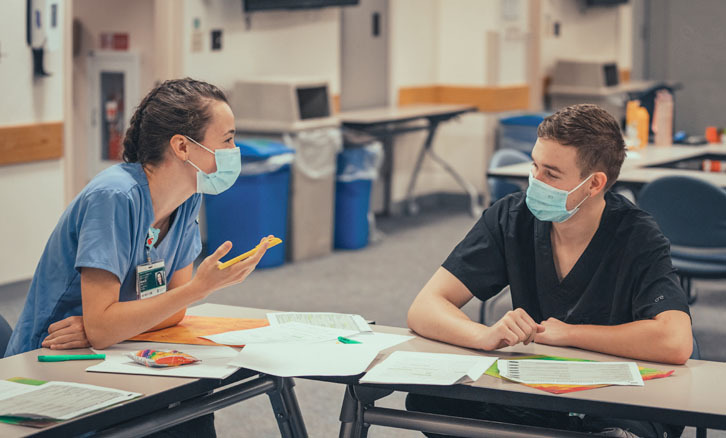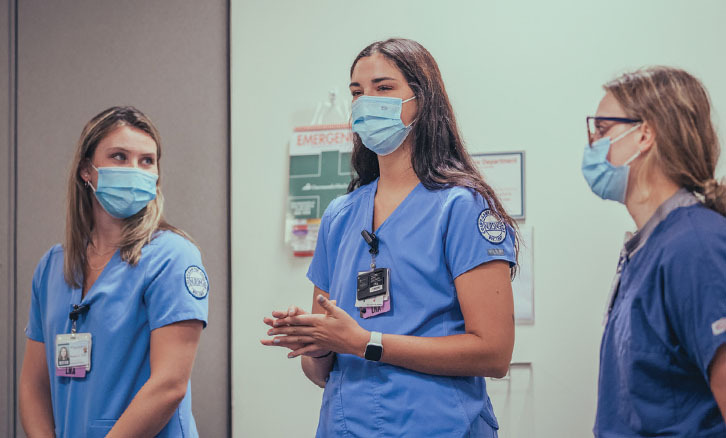Few choices we make have as much impact on our daily lives as our choice of career. The stakes are high, and once we’ve committed, it can be difficult, time consuming and expensive to change direction. This is a common concern for many college students, who are often first introduced to some of the more practical aspects of their profession after they’ve already earned a degree. Nursing, with its significant clinical component, is an exception to this rule. And for the student nurses who take advantage of special opportunities like Colby-Sawyer’s LNA summer nurse internship at Dartmouth Health, the post-graduation workplace holds very few surprises.
The LNA summer internship is designed for nursing students in their second or third year of study, a point at which most have completed some amount of clinical work and are seriously considering which specialty to choose for a senior practicum. It is the point at which Dartmouth Hitchcock Medical Center Nurse Educator Tracie Ruggles believes it’s important for advanced students to spend a summer really getting to know the ins and outs of their chosen field.

“It’s an opportunity for them to explore care environments,” Ruggles said. “Students sometimes think they have a specific interest, that they know where they want to land and what they want to do after they graduate. But, during their clinical rotations, they have a sort of an abbreviated experience. The LNA program allows them to have a saturated experience. They can say, ‘Do I really want to be an ICU nurse? Do I really want to be a neonatal intensive care unit nurse?’ Sometimes they want to choose a specialty based on what they think it’s like, and spending a summer working in some of these care areas as an LNA helps them to really see the work and make informed decisions about where they want to be.”
This is exactly what happened to Maddie Gaskell, a rising senior in Colby-Sawyer’s nursing program. “I thought I would love pediatrics because I’ve always babysat. But on the floor, you have different feelings,” Gaskell said. “And for me, when I was in OB for the first time, I just felt calm. And I was like, ‘I think this is where I should be.’ ”
Conversely, rising junior Emilie Bouchard already knew exactly what she wants to do. “They tell you by your junior year start thinking about your practicum, and I knew my end goal is to be a pediatric oncology nurse,” said Bouchard, who had explored the oncology aspect of that specialty during a clinical rotation but had not yet spent time on the competitive pediatrics floor. “I did a clinical rotation on One West, which is the cancer floor. That solidified my plan — I thought, ‘Okay, this is exactly what I want to go into.’ So, then I was like, ‘Okay, I need some pediatrics to just get used to working with children, because the way you talk to a child is completely different from how you’re going to talk to an adult.’ ”
“The LNA program allows them to have a saturated experience.”
– Tracie Ruggles
Nurse Educator Dartmouth Hitchcock Medical Center
The LNA program is also an opportunity for students to increase their chances of gaining entry into the more competitive specialties during their senior practicums. For students who are hoping to end up in pediatrics, obstetrics or trauma care, an entire summer of networking and practical experience can be the best way to get a toe in an otherwise very selective door.
Gaskell said she knew that without the internship, finding a spot in obstetrics might be challenging. “I really wanted to get on the floor and start making relationships with the people that I hope to work with in the future,” Gaskell said. “But it’s super hard without going through the LNA internship — I think it’s very difficult to get on the birthing pavilion floor as just [a regular] LNA.” She explained that COVID-19 restrictions have made typical job-shadowing opportunities hard to come by; however, spots are reserved and available for students in the internship program.
Bouchard’s intended specialty is also one of the most competitive. When she shared her goal with her advisors, they emphasized the ‘audition’ aspect of the LNA opportunity. “They were like, ‘Okay, make yourself known, because there’s a lot of people that want to go for this,’ ” Bouchard said. She said she hopes that during her time on the pediatric floor, she’ll make a positive impression on the people who will decide whether she’ll be accepted to pediatric oncology for her practicum during her senior year.

For other students, the primary appeal of the internship is the additional professional development programming. “I decided to do the LNA program this summer because I learned about all the networking and educational opportunities that they build into the program,” rising junior Bri Laycock explained. Laycock already had a thorough understanding of hands-on patient care as an LNA, having spent a year working on a general surgery floor during the height of the COVID-19 pandemic. Still, she said she found the additional professional development opportunities offered every few weeks to be useful. One session focused on communication and work ethic. “We got to talk as a group,” Laycock said, “and I really loved the part where you get to debrief with the other interns, and just talk about how things are going or what you could improve on in your practice.”
Fortunately, even students who don’t have Laycock’s frontline experience as a practicing LNA have access to the Dartmouth Health summer internship program. Completion of the Fundamentals of Nursing course, which is part of the nursing curriculum, is sufficient qualification for Colby-Sawyer nursing students to apply for the LNA license they need to begin the internship. This means that traditional students who haven’t worked in a hospital environment outside of their brief clinical rotations also have the chance to learn experientially by immersing themselves in the daily rhythms of a hospital floor.
That was the primary motivation for Jaelynn Currie, a rising junior. Currie’s internship was in Dartmouth Health’s hematology oncology clinic, which sees approximately 3,000 patients each month. “I’m a hands-on learner,” Currie said. “So, I felt like doing something like this over the summer would be good for me to get practice in nursing experience and more patient interaction.”
Of course, for patients and students alike, a hospital can be an intimidating place. After all, this is where lives begin and end, and is the setting of some of a person’s most intense and intimate moments. “It definitely can be nerve-wracking at times,” Gaskell said, “but I think they set you up for success. So, at least as a student, you’re learning, and they know you’re learning, and they won’t put you in a situation where you can make serious errors.”
With the support of program advisors, mentor nurses and their peers, Colby-Sawyer LNAs have the resources they need to grow. “Now I feel like I’m more confident speaking to people and answering questions, whereas before, I was shy about just walking into patient’s room,” Bouchard said.
For Dartmouth Health, the hope is that these talented students will eventually join their staff as fully qualified nurses — but the program is more than a recruitment tool. “In the end,” Ruggles said, “regardless of whether they come to work for us or not, we want to help them to be as prepared as possible to enter the workforce as new nurses.”